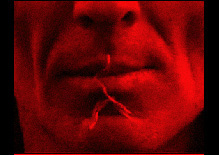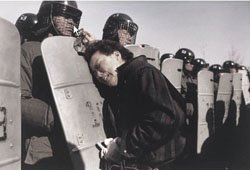The Financial Times
By Haig Simonian, recently in Yerevan
Published: November 3 2008
Gathered for an evening of talk and music to celebrate their city’s anniversary, the mood is palpably upbeat among the crowds in Republic Square, the traditional meeting place in Armenia’s capital.
Clever lighting brings out the best in the four stately curved buildings that define the huge space, as popular for gatherings in communist times as it is today. In front, a large stage stands by the neo-classical national museum for the rock band and assorted dignitaries involved.
But once the music stops on the dot of 11pm, the square in Yerevan empties in minutes. As the stragglers leave, no less than 12 police cars descend on the increasingly deserted space, warning lights ablaze.
Their presence is a reminder of the political tensions that lurk below the surface, even eight months after contested presidential elections. Within days of the February vote, unrest erupted as Levon Ter-Petrosian, the country’s first post communist president, accused the victor Serge Sarkisian, a former defence minister, of ballot-rigging.
Mr Ter-Petrosian was seeking a return to power after being ousted in 1998 by Robert Kocharian, Mr Sarkisian’s mentor. His claims and subsequent big public demonstrations culminated in a police crackdown that left 10 dead and 75 opposition supporters in prison.
On this particular evening in Republic Square, there are no incidents. But, opposition leaders say political repression is still widespread in one of the most strategically significant parts of the Caucasus.
Armenia is not alone in facing accusations of repression and electoral fraud. Neighbouring Georgia has seen growing criticism of the allegedly authoritarian rule of president Mikheil Saakashvili, though there has been greater unity since the country’s brief conflict with Russia. And in Azerbaijan, last month’s elections produced predictable claims by the opposition that the polls were a sham.
Armen Harutiunian, Armenia’s ombudsman and the man entrusted with protecting human rights, says the government has resorted to “the methods of 1937” to consolidate power and curb opposition, referring to Stalin’s purges.
Mr Harutiunian, a lawyer who headed Armenia’s public administration academy before his appointment in 2006, is equally dismissive of parliament, which he says is overwhelmed by parties loyal to the government.
“The government only wants an opposition for decoration to please the west. There’s no real opposition,” he argues.
Mr Harutiunian swats away the official investigation set up to examine the post election violence as “a farce”. And he claims the government has applied direct and indirect pressure to limit his own efforts to uncover political abuse.
Opposition leaders reinforce such claims. Levon Zouhrabian, a top official of Mr Ter-Petrosian’s Armenian National Congress party, accuses the government of taking unprecedented action to restrict freedom of speech. “There are people who have spoken out and regretted it, but we are not afraid”, he says. Such comments are echoed by MPs from the Jarangoutioun (Heritage) party, the only opposition group still represented in parliament.
skip to main |
skip to sidebar



La police d'émeute et une mère aprés que son fils ait été arrêté à la démonstration accusant le gouvernement de la fraude dans les élections présidentielles. Corée 1978. Anthony Suau

Tiananmen 1989

Election - Ընտրություններ /// Twitter / himaarmenia
Վերջին նորություններ
liens / կայքեր
- e-Channel
- ՀՀ քաղաքական բանտարկյալների եւ հալածյալների պաշտպանության կոմիտե
- Ծիծեռնակ
- massisweekly.com
- hima.blogspot.com
- armenianow.com
- hetq.am
- infoarmenia.org
- ditord.wordpress.com
- payqar.net
- eurasianet /armenia: vote 2008
- Photos - NYT
- yevrobatsi.org
- a1plus.am
- aravot.am
- armenaker.blog
- martimek.livejournal.com
PETITION
ՀԱՅՏԱՐԱՐՈՒԹՅՈՒՆԵՐ DECLARATIONS

Comité SDA - հայ - fr
Human Rights Watch - eng
Lettre de femmes et mères- fr
Հավատացեալները ԱՀ Կաթողիկոսին - հայ
NGOs Arménie -eng
Policy Forum Armenia - eng
Lettre au Secrétaire Général de l'OSCE (Allemagne) - de
Pétition à l'ONU - eng
Groupe parlementaire Suisse-Arménie - fr
Conseil National Arménien - fr
Sos Armenia (Georgie) - eng
MCC à R. Kocharian - eng
Sos NGOs Arménie - eng
Parti Conservative - eng
To Aremenians of America - eng
Human Rights Watch - eng
Lettre de femmes et mères- fr
Հավատացեալները ԱՀ Կաթողիկոսին - հայ
NGOs Arménie -eng
Policy Forum Armenia - eng
Lettre au Secrétaire Général de l'OSCE (Allemagne) - de
Pétition à l'ONU - eng
Groupe parlementaire Suisse-Arménie - fr
Conseil National Arménien - fr
Sos Armenia (Georgie) - eng
MCC à R. Kocharian - eng
Sos NGOs Arménie - eng
Parti Conservative - eng
To Aremenians of America - eng
"JAMANAK" et "PAIQAR" EN PDF
Global Voices Online

HISTOIRE / ՊԱՏՄՈՒԹՅՈՒՆԻՑ

La police d'émeute et une mère aprés que son fils ait été arrêté à la démonstration accusant le gouvernement de la fraude dans les élections présidentielles. Corée 1978. Anthony Suau

Tiananmen 1989
ընդամենը
այցելում




